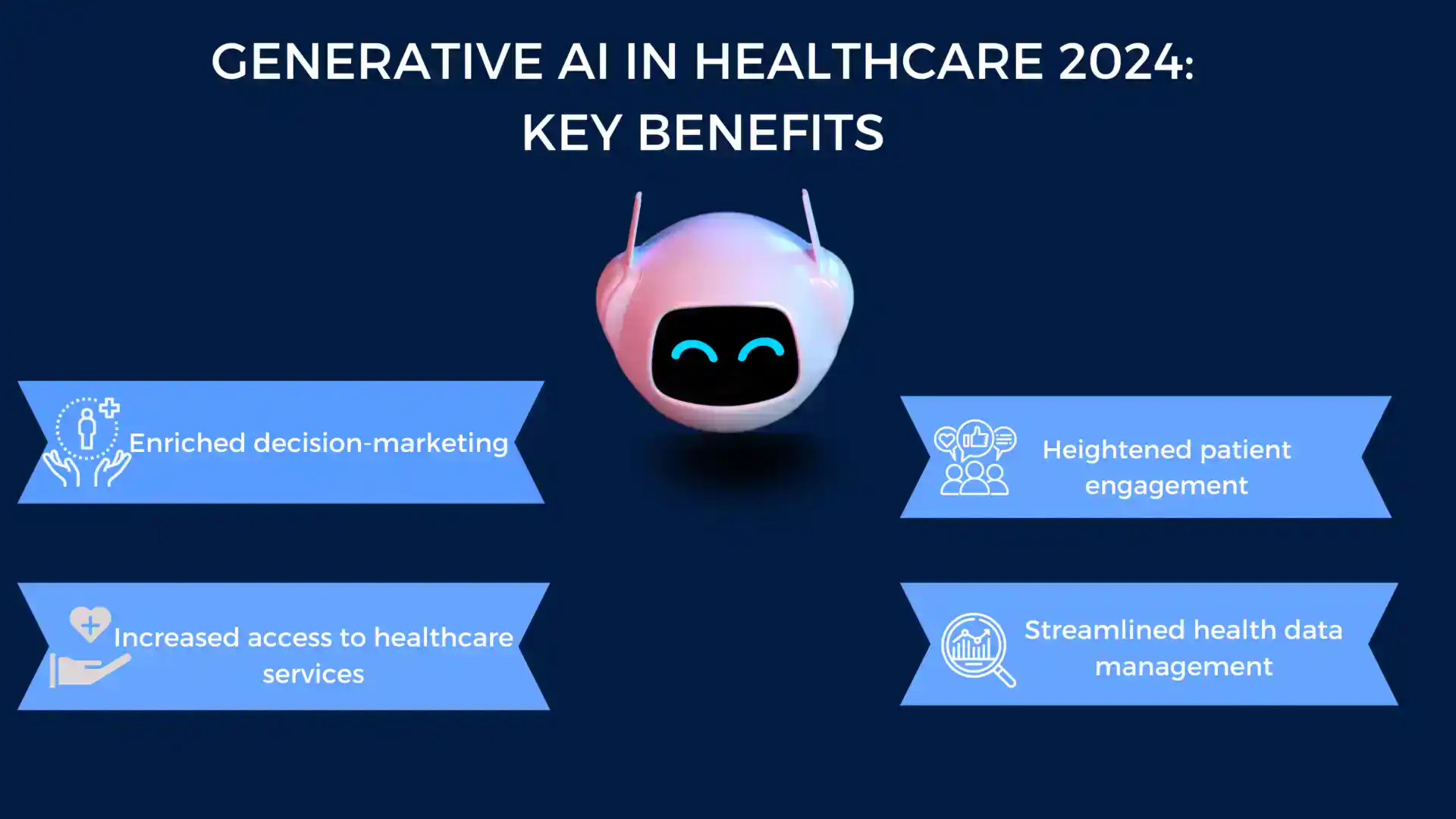Table of Contents
The year 2024 marks a pivotal moment in the healthcare landscape, characterized by the rapid integration and evolution of generative artificial intelligence (AI). This technological revolution has unleashed a wave of innovations, transforming the way healthcare is delivered, managed, and experienced worldwide.
From personalized treatment plans to streamlined diagnostics, the impact of generative AI in healthcare has been nothing short of revolutionary.
Enhanced Diagnostics and Disease Prediction
Generative AI algorithms, empowered by machine learning and deep neural networks, have significantly enhanced diagnostic capabilities. These systems analyze vast datasets comprising patient records, genetic information, and medical imaging with unparalleled accuracy and speed. Through pattern recognition and predictive analytics, these AI systems can identify subtle markers indicative of diseases at their earliest stages, often before symptoms manifest.
For instance, in 2024, there’s been a paradigm shift in cancer detection. Generative AI algorithms can detect minute irregularities in imaging scans, enabling early-stage cancer diagnosis with unprecedented precision. This has led to higher survival rates and more effective treatment plans tailored to individual patients.
Personalized Treatment and Drug Development
One of the most groundbreaking impacts of Generative AI in Healthcare 2024 is the advancement of personalized medicine. By analyzing genetic makeup, lifestyle factors, and medical histories, AI algorithms can generate personalized treatment plans. These plans consider an individual’s unique biological characteristics, ensuring more effective and targeted therapies while minimizing adverse effects.
Moreover, Generative AI in Healthcare 2024 has revolutionized the drug development process. AI-powered algorithms predict potential drug interactions, analyze molecular structures, and simulate drug behavior, significantly accelerating the discovery and development of new medications. This acceleration has resulted in the rapid introduction of groundbreaking drugs, tailored to specific genetic profiles and disease characteristics.

Remote Patient Monitoring and Telemedicine
The integration of Generative AI in Healthcare 2024 has also fostered the expansion of remote patient monitoring and telemedicine. Wearable devices equipped with AI algorithms continuously collect and analyze vital health data, allowing for real-time monitoring of patients’ conditions. These devices provide early warnings for health complications, enabling timely interventions and reducing hospital readmissions.
Telemedicine has experienced a remarkable evolution as well. AI-powered virtual assistants equipped with natural language processing capabilities offer personalized medical advice and guidance. Patients can consult these assistants anytime, anywhere, fostering better healthcare accessibility, especially for underserved communities.
Generative AI in Healthcare 2024: Revolutionizing Alignment
The healthcare industry grapples with disconnection and inefficiencies among stakeholders, hindering optimal patient care. Administrative tasks compound this issue, contributing to healthcare worker burnout and compromised patient outcomes. The American Medical Association (AMA) highlights how 89% of physicians cite prior authorization delays as detrimental to clinical results.
Streamlined Workflows and Enhanced Engagement
Generative AI in Healthcare 2024 emerges as a transformative force, promising to overhaul healthcare operations. Automating administrative burdens, liberates providers to focus more on direct patient care. This efficiency boost not only curtails burnout but also augments patient engagement. Generative AI in Healthcare 2024 facilitates personalized, easily digestible health information, empowering patients to take a proactive role in their well-being.
In 2024, Generative AI will revolutionize healthcare, offering transformative benefits:
- Informed Decision-Making: AI swiftly analyzes complex data, aiding precise diagnoses and tailored treatments, optimizing resource use.
- Enhanced Patient Engagement: Personalized health info empowers patients, boosting adherence and collaboration with healthcare providers.
- Widened Healthcare Access: AI-driven telemedicine and monitoring bridge gaps, ensuring quality healthcare for all, irrespective of location.
- Efficient Data Management: AI streamlines handling vast health data, ensuring accessibility, security, and seamless information sharing.
Generative AI in 2024 will reshape healthcare, fostering informed decisions, active patient involvement, expanded access, and streamlined data management for improved global healthcare outcomes.

Empowering Providers, Elevating Patient Care
Imagine automated outreach initiatives—like flu shot reminders—yielding exceptional response rates and fostering unparalleled patient experiences. Equipped with AI, healthcare providers reallocate time and expertise to diagnosis and treatment, elevating the standard for patient care and satisfaction. Generative AI’s integration aligns with stakeholders, and interests, and promises a healthcare system centered on improved outcomes and seamless engagement.
Challenges and Ethical Considerations
However, the integration of generative AI in healthcare 2024 is not without challenges and ethical considerations. Privacy concerns regarding the use of sensitive medical data and the potential for algorithm biases require stringent regulations and ethical frameworks. Ensuring transparency, accountability, and fairness in AI-driven healthcare interventions remains a critical priority.
Additionally, the need for continuous validation and refinement of AI algorithms to maintain accuracy and reliability is crucial. Continuous training with diverse and representative datasets is essential to mitigate biases and ensure equitable healthcare outcomes for all demographics.
Conclusion
In 2024, the generative AI revolution in healthcare has significantly reshaped the industry’s landscape. From early disease detection and personalized treatments to remote patient monitoring, the potential for AI-driven healthcare innovations continues to expand. However, addressing ethical concerns, ensuring data privacy, and refining AI algorithms are imperative to harness the full potential of this transformative technology.
As we journey further into the future, the collaborative efforts of healthcare professionals, policymakers, technologists, and ethicists will play a pivotal role in maximizing the benefits of generative AI in healthcare 2024 while safeguarding patient welfare and ensuring equitable healthcare access for all. The promise of AI-driven healthcare remains vast, holding the potential to revolutionize patient care and redefine the boundaries of medical possibilities.
FAQs on the Transformative Role of Generative AI in Healthcare 2024
Q1: What is Generative AI’s role in healthcare, particularly in 2024 and beyond?
A1: Generative AI has a pivotal role in healthcare, significantly impacting diagnostics, personalized treatment plans, drug development, remote patient monitoring, and telemedicine. By leveraging vast datasets and advanced algorithms, it revolutionizes healthcare delivery and management.
Q2: How does Generative AI enhance diagnostics in healthcare?
A2: Generative AI excels in analyzing patient records, genetic information, and medical imaging swiftly and accurately. This capability allows for early disease detection by identifying subtle markers before symptoms appear, leading to more precise diagnoses and timely interventions.
Q3: What advancements has Generative AI brought to personalized medicine?
A3: Generative AI tailors treatment plans by analyzing an individual’s genetic makeup, lifestyle factors, and medical history. This personalized approach ensures more effective therapies while minimizing adverse effects, marking a significant leap in precision medicine.





